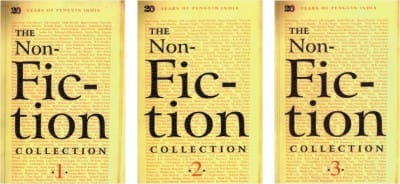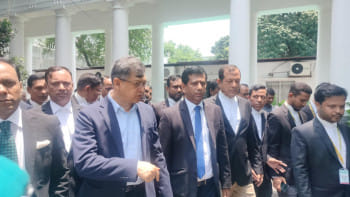Penguin India's Non-Fiction: they should have kept the table!

Reading through the introduction to Penguin India's the triple-decker volumes of The Non-Fiction Collection (New Delhi: 2007) - one is plunged headlong into the facts behind India's supreme publishing powerhouse: that it began operating at a time when "trade publishing in English" was virtually unknown in the country (which might be a slight exaggeration since small publication houses were always operating in that country), and that Penguin's operational beginnings were becomingly modest - "the company launched its local programme in 1987 with seven titles: two novels in English and one in translation from Bengali, two biographies, a travelogue and a book of poems."
Today, relatively speaking, Penguin India is the proverbial 800-pound gorilla in the room, or ring, ('in the corner wearing yellow trunks weighing in at a …'), bringing out 200 new books annually across a wide range of genres. It also claims to have on its list, and rightly one thinks, authors from every country in the subcontinentin fact, it seems that had Penguin not continued to publish out-of-India authors like Nepalese Manjushree Thapar and the rambunctious Sri Lankese Burgher portraitist Carl Muller (whose latest offering Maudiegirl and the von Bloss Kitchen is out under Penguin India imprint), it is quite likely that they would have been known only inside their own countries, and that too insufficiently. More and more it seems that to get a decent South Asian name and audience one needs the Penguin seal of good housekeeping. Penguin has also ventured into publishing English translations of classics in India's regional languages. In 2005, with the launch of its Hindi list, Penguin says it became the "first global publisher to publish in an Indian language other than English", and that now it releases over sixty titles every year in Hindi, Marathi, Malayalam and Urdu. Though translations of Bengali classics by Tagore, Bankim and Sharatchandra are out in Penguin editions, one was to wonder why Penguin does not publicize them. Regarding translations, Penguin India is also lucky enough to also draw on its global resources, as is evident from their recent publication of the English translation of Mario Vargas Llosa's In The Feast of the Goat. At a price markedly cheaper in Kolkata, one should mention, than it would be were it to be bought by visiting Indian bhabis in New York.
Non-fiction writing seems to be gaining popularity among writers and readers alike in South Asia, as attested to by the growing number of publications in this genre (not the least of which is Penguin's own other first-rate publication titled First Proof). Which is why no doubt Penguin India thought that it was an opportune time to come out with a triple-decker publication. Here the publisher rightly aimed at a broad coverage, and therefore it is no surprise to see that the volumes contain writing on all conceivable topics, from the straight reportage of Bollywood Mumbai in the film magazine 'Star Dust' to opinion pieces on Kashmir and Gujarat, from internal migration and refugees to a changing Benares city. As a natural corollary therefore it is no great surprise that the list of writers seems to embrace a diverse group of writers and scribes, with prominent authors cozying up beside the none-too-prominent ones: India's ex-cricket coach John Wright beside Khushwant Singh and Satyajit Ray, Chitrita Banerji (with her fine writing on East Bengal, and particularly Mymensingh, cooking) up alongside Arundhati Roy, Kamala Das and Ruskin Bond. The criterion for selection and publication seems to have been all prose writing dealing with India, though in the case of Fareed Zakaria (an American) and Sara Suleri (a Pakistani) the connection seems slim indeed, with the only standard seems to have been published by Penguin somewhere, some time. This wide choice of writers naturally makes for quality that can dip, and there are pieces lumped in here with others that can be truthfully said to not quite match up. On the other hand, readers are introduced to many a fine but otherwise relatively unknown writer.
Uneven quality is an unavoidable risk in a publication wanting to cover all possible bases, and when the publisher claims that here are showcased authors who have topped best-seller charts in India and abroad, and won virtually every major literary prize, including the Nobel Prize, the Jananpath Award, the Man Booker Prize, the Shahitya Akademi Award and the Commonwealth Writers' Prize, that it "is unlikely that you will find a richer, more representative collection of writing from or about South Asia," one tends to agree with them.
In the foreword the publisher reminiscences, in the context of Penguin India's long journey to its present pre-eminence, that "when it was set up in a two-bedroom flat in New Delhi Penguin India's most valuable asset was a boardroom table made of teak, at which strategies were devised, contracts signed and commitments made. Today, the table is no longer listed among the company's assets", since it has been replaced by…well, what is termed as "the finest list of Indian authors (or authors of Indian origin) anywhere in the world." Which is all very fine, but this reviewer begs to differ. Why ditch that loyal teak table? Damned shame we say…

 For all latest news, follow The Daily Star's Google News channel.
For all latest news, follow The Daily Star's Google News channel. 



Comments